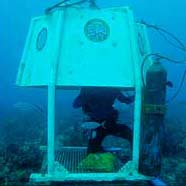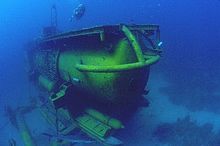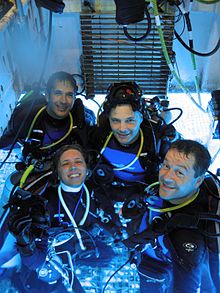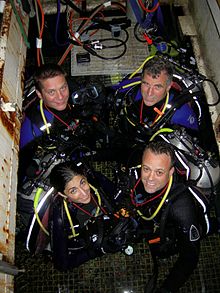NEEMO
NEEMO ( english N ASA E xtreme E nvironment M ission O pera tion ) is a research program of the National Aeronautics and Space Administration (NASA) in the experiments to life on a space station in an underwater laboratory ( Aquarius ) of the NOAA be performed. The Aquarius offers a similar environment to that provided by the International Space Station (ISS). For example, the size of the Aquarius habitat corresponds roughly to the size of the Zvezda module of the ISS.
Aquarius is the only underwater scientific research facility of its kind in the world.
Aquarius
The Aquarius underwater laboratory was built in 1986 in Victoria ( Texas ) and initially released off the US Virgin Islands , but later moved to its current location in the Florida Keys National Marine Sanctuary , located off Key Largo ( Florida Keys ). The laboratory - 13 m long and 6 m high, with an inner diameter of 2.7 m - is 5.6 km offshore at a depth of 19 m next to large coral reefs . The Aquarius habitat is 15 m deep and is fixed over a plate embedded in the ground. The atmospheric pressure in the Aquarius is about 2.5 times higher than at sea level. The pressure in the Aquarius corresponds to that of the surrounding water and the main entrance to the habitat can remain open to the sea.
Aquarius is a project of the National Oceanic and Atmospheric Administration (NOAA) and is carried out by the NOAA Undersea Research Center (NURC) at the University of North Carolina at Wilmington as part of the NOAA Undersea Research Program (NURP).
The crew of the Aquarius consists of four NASA astronauts (called Aquanauts) and two technicians from the NURC, who are responsible for the technical operation of the Aquarius. The crew stays in the habitat for up to 18 days. Two other employees form the watch desk on Key Largo. Your task is to coordinate the tasks and processes in the habitat. The function of the security team corresponds to the function of the Mission Control Center of NASA.
The two resting places Pinnacle and Gazebo are located near the habitat . These are air bells that the Aquanaut can use while diving without their own breathing apparatus.
Missions
NEEMO 1
Period: October 21-27, 2001
Crew:
NASA aquanauts
- Mike Gernhardt
- Mike López-Alegría
- Bill Todd ( United Space Alliance at JSC)
- Dave Williams ( Canadian Space Agency )
NURC Habitat Technician
- Mark Hulsbeck
- Ryan Snow
NEEMO 2
Period: May 13-20, 2002
Crew:
NASA aquanauts
NURC Habitat Technician
- Thor Dunmire
- Ryan Snow
NEEMO 3
Period: July 15-21, 2002
Crew:
NASA aquanauts
- Greg Chamitoff
- Jonathan Dory (SPACEHAB Inc., for NASA's Habitability and Environmental Factors Office)
- Danny Olivas
- Jeff Williams
NURC Habitat Technician
- Byron Croker
- Michael Smith
NEEMO 4
Period: September 23-27, 2002
Crew:
NASA aquanauts
NURC Habitat Technician
- James Talacek
- Ryan Snow
NEEMO 5
Period: June 16-29, 2003
Crew:
NASA aquanauts
NURC Habitat Technician
- James Talacek
- Ryan Snow
The aim of the mission was to research the living conditions similar to those in a space station in orbit, as well as the development of methods and devices for communication over longer distances between astronauts during an outboard activity with the space station. Other tasks related to team building, interpersonal and leadership behavior.
Various physical and psychological changes can occur during the stay in weightlessness. The NEEMO 5 team carried out twelve experiments and researched the effects on sleep and the immune system as well as the growth of bacteria. Wireless medical observation and control instruments were also tested and nutritional studies were carried out.
In addition, a device for future spacecraft activities was tested with which nitrogen bubbles can be detected in the blood and thus warn of decompression sickness in good time .
NEEMO 6
Period: July 12-21, 2004
Crew:
NASA aquanauts
NURC Habitat Technician
- Craig Cooper
- Joseph March
The ten-day mission was devoted to biomedical research. The Johnson Space Center's biomedical department researched the effects of weightlessness on human physiology during this mission . The suitability of various medical devices for space travel was to be demonstrated.
Further goals of NEEMO 6 were to expose the crew to a real mission experience in an extreme environment and thus prepare them for future space flights. Structures similar to those of the ISS were built underwater by the Aquanauts.
NEEMO 7
Period: October 11-21, 2004
Crew: NASA aquanauts
NURC Habitat Technician
- Craig Cooper
- Joe March
The aim of this mission was to test remote medical and surgical diagnostic and remote robotic technologies in an extreme environment. The tests were required for future, longer space flights (planned flights to the moon and Mars) and for the stay on the ISS.
NEEMO 8
Period: April 20-22, 2005
Crew:
NASA aquanauts
NURC Habitat Technician
- Craig Cooper
- Joe March
NEEMO 9
Period: April 3rd to 20th, 2006
Crew:
NASA aquanauts
NURC Habitat Technician
- Jim Buckley
- Ross Hein
During this mission, medical procedures for remote diagnosis, remote monitoring and remote surgery were tested. These procedures are required for future flights to the moon or Mars or in emergencies on the ISS. The aquanauts also went on excursions on the seabed. They used sophisticated breathing helmets and weights to simulate the pull of the moon.
NEEMO 10
Period: July 22nd to 28th, 2006
Crew:
NASA aquanauts
NURC Habitat Technician
- Mark Hulsbeck
- Dominic Landucci
The purpose of this mission was to prepare for future flights to the moon and Mars. Movement concepts were tested and the gravitational pull of the moon or Mars was simulated with weighted rucksacks. Communication techniques as well as the use and navigation of remote controlled robots on the surface of the moon were also examined.
NEEMO 11
Period: September 16-22, 2006
Crew:
NASA aquanauts
NURC Habitat Technician
- Roger Garcia
- Larry Ward
The aquanauts tested the mobility under water with different spacesuits and imitated the lunar attraction with additional weights. In addition, new communication and navigation techniques were tested. Other tasks included testing methods for collecting geological samples and building and using remote-controlled robots.
NEEMO 12
Period: May 7th to 17th, 2007
Crew:
NASA aquanauts
- Heidemarie Stefanyshyn-Piper
- Jose Hernandez
- Josef Schmid
- Timothy Broderick
NURC Habitat Technician
- James Talacek
- Dominic Landucci
NEEMO 13
Period: August 6th to 15th, 2007
Crew:
NASA aquanauts
NURC Habitat Technician
- Jim Buckley
- Larry Ward
NEEMO 14
Period: May 10-24, 2010
Crew:
NASA aquanauts
- Chris Austin Hadfield
- Thomas Henry Marshburn
- Underwater engineer Andrew Abercromby
- Scientist Steve Chappell
Aquarius Reef Base support crew:
- James Talacek
- Nate Bender
- Bill Todd, Mission Director
NEEMO 15
Period: October 20 to 26, 2011 (started 4 days late due to severe weather, canceled after 6 mission days due to the risk of severe weather (Hurricane Rina))
Crew:
NASA aquanauts
- Shannon Walker ; NASA; commander
- Takuya Ōnishi ; JAXA
- David Saint-Jacques ; CSA
- Steve Squyres (Cornell University), (University of North Carolina, Wilmington), scientific principal investigator for the Mars Exploration Rover Project.
Aquarius Reef Base support crew
- James Talacek
- Nate Bender
Talacek and Bender (both University of North Carolina, Wilmington) are professional aquanauts.
In DeepWorker U-Boot (moon & asteroid landing simulation):
Capcoms
- Jeremy Hansen (CSA)
- Jeanette Epps (NASA)
During the mission, the team carried out many submarine "moon walks" to examine concepts for future lunar exploration and to test the new navigation and communication equipment.
NEEMO 16
Period: 11-22 June 2012
Crew:
NASA aquanauts
- Dorothy Metcalf-Lindenburger ; NASA; commander
- Kimiya Yui ; JAXA
- Timothy Peake ; ESA; Great Britain
- Steve Squyres (Cornell University), (University of North Carolina, Wilmington), scientific principal investigator for the Mars Exploration Rover Project.
(NEEMO 17) SEATEST II
Period / location: September 9th to 13th, 2013 Space Environment Analog for Testing EVA Systems and Training (NEEMO 17)
NASA Aquanaut Crew:
- Joe Acaba , NASA, commander
- Kathleen Hallisey Rubins , NASA, USA
- Andreas Mogensen , ESA, Denmark
- Sōichi Noguchi , JAXA, Japan
- Thomas Pesquet , ESA, France
Aquarius Reef Base support crew
- Mark Hulsbeck
- Otto Rutten
NEEMO 18
Announced together with # 19 on June 10, 2014.
Date / Location: 9 days from July 21, 2014 / Florida Keys
- Akihiko Hoshide , JAXA, commander
- Jeanette Epps
- Mark Thomas Vande Hei
- Thomas Pesquet , France / ESA
NEEMO 19
Time / Location: September 7th to 13th, 2014 / Florida Keys
crew
- Randolph Bresnik , NASA, commander
- Jeremy Hansen , CSA, Canada, Flight Engineer 1
- Andreas Mogensen , ESA, Denmark, Flight Engineer 2
- Hervé Stevenin, head of the training department for space exits at the European Astronaut Center in Cologne. Flight Engineer 3
Aquarius Reef Base support crew
- Mark Hulsbeck
- Ryan LaPete
NEEMO 20
Date / Location: July 20 to August 2, 2015 / Florida Keys
crew
- Luca Parmitano ( Italy / ESA ), commander
- Serena Auñón , NASA
- David Coan, NASA EVA Management Office engineer
- Norishige Kanai ( Japan / JAXA )
Professional habitat technicians, Aquarius Reef Base support crew
- Mark Hulsbeck
- Sean Moore
NEEMO 21
Dates / Location: July 21 to August 5, 2016 / Florida Keys
crew
- Reid Wiseman , NASA, Commander 1st
- Megan McArthur , NASA, Commander 2nd
- Marc O´Griofa, (Teloregen / VEGA / AirDocs)
- Matthias Maurer , ESA; Germany
- Dawn Kernagis (Institute for Human & Machine Cognition)
- Noel Du Toit (Naval Postgraduate School)
Professional habitat technicians, Aquarius Reef Base support crew
- Hank Stark
- Sean Moore
NEEMO 22
Period / location: June 18 to June 28, 2017 / Florida Keys
crew
- Kjell Lindgren , NASA, commander
- Pedro Francisco Duque , ESA, Spain
- Trevor Graff, Jacobs Engineering employee, planetary scientist at NASA Johnson Space Center in Houston
- Dominic D'Agostino, scientist at the University of South Florida and the Florida Institute for Human & Machine Cognition
Professional habitat technicians, Aquarius Reef Base support crew
- Mark Hulsbeck
- Sean Moore
Individual evidence
- ↑ http://www.nasa.gov/mission_pages/NEEMO/NEEMO15/wrapup-report.html accessed on June 11, 2014
- ↑ http://orf.at/#/stories/2233590/ NASA is planning two new underwater missions, ORF.at from June 10, 2014
- ↑ http://www.nasa.gov/press/2014/june/nasa-announces-two-upcoming-undersea-missions/ NASA Announces Two Upcoming Undersea Missions, June 10, 2014, accessed June 11, 2014
- ↑ NASA is planning two new underwater missions , ORF.at from June 10, 2014
- ↑ Hervé Stevenin. ESA, July 17, 2014, accessed August 9, 2014 .
- ↑ NASA is planning two new underwater missions , ORF.at from June 10, 2014
Web links
- NASA: NEEMO (English)
- NOAA's Aquarius Undersea Laboratory (English)
- NASA: The Undersea Experience: An Analog to Outer Space (English)
- WebCam (English)
Coordinates: 24 ° 57 ′ 0 ″ N , 80 ° 27 ′ 13 ″ W.








